24 jan 2020
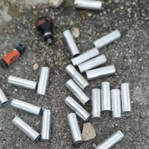
At least four Palestinians were wounded on Friday when the Israeli occupation forces (IOF) violently quelled peaceful protests in Qalqilya and Ramallah in the West Bank.
In Qalqilya three Palestinian demonstrators were injured when the IOF attacked the weekly march in Kafr Qaddum with rubber-coated metal bullets and tear gas grenades.
Activist Murad Shtewi said that a Jewish peace activist was among the injured.
Every Friday the residents of Kafr Qaddum take to the streets to protest the ongoing settlement construction on Palestinian land and to call for opening the village's main road which has been closed by the IOF for 16 years.
Meanwhile, a Palestinian youth was injured by IOF live ammunition during confrontations in Deir Nizam village northwest of Ramallah City.
Local sources said that violent clashes flared up in Deir Nizam after the IOF abruptly raided the village.
The Palestinian Red Crescent Society said in a brief statement that a Palestinian youth was shot in the back during the clashes and described his injury as "moderate".
Israeli Soldiers Injure Three In Kufur Qaddoum
Israeli soldiers attacked, Friday, the weekly procession in Kufur Qaddoum, east of the northern West Bank city of Qalqilia, and injured two Palestinians and one Israeli peace activist.
Morad Eshteiwi, the coordinator of the Popular Committee against the Annexation Wall and Colonies in Kufur Qaddoum, said the soldiers surrounded the village and fired a barrage of gas bombs at the protesters and several surrounding homes. video video
He added that many youngsters hurled stones at the soldiers, who were trying to invade the village, while the army fired many live rounds, gas bombs, concussion grenades, and rubber-coated steel bullets at random.
Medical sources in Kufur Qaddoum said the soldiers injured a Palestinian, identified as Amin Eshteiwi, and an Israeli peace activist, with sponge-tipped bullets, before they were rushed to a hospital.
In addition, a Palestinian woman with a heart defect suffered the effects of teargas inhalation in her homes, and was rushed to a hospital.
Eshteiwi stated that the procession was attended by hundreds of Palestinians, accompanied by Israeli and international peace activists, who marched chanting against the ongoing illegal Israeli occupation, its escalating violations, and colonies.
Kufur Qaddoum witnesses frequent Israeli invasions, assaults and abductions as it continues to hold its weekly nonviolent processions against the illegal Annexation Wall and colonies, and against the closure of the main road, which was blockaded by the military fifteen years ago, to enable easy access for colonialist settlers driving to and from the Kedumim colony, built on private Palestinian lands.
In Qalqilya three Palestinian demonstrators were injured when the IOF attacked the weekly march in Kafr Qaddum with rubber-coated metal bullets and tear gas grenades.
Activist Murad Shtewi said that a Jewish peace activist was among the injured.
Every Friday the residents of Kafr Qaddum take to the streets to protest the ongoing settlement construction on Palestinian land and to call for opening the village's main road which has been closed by the IOF for 16 years.
Meanwhile, a Palestinian youth was injured by IOF live ammunition during confrontations in Deir Nizam village northwest of Ramallah City.
Local sources said that violent clashes flared up in Deir Nizam after the IOF abruptly raided the village.
The Palestinian Red Crescent Society said in a brief statement that a Palestinian youth was shot in the back during the clashes and described his injury as "moderate".
Israeli Soldiers Injure Three In Kufur Qaddoum
Israeli soldiers attacked, Friday, the weekly procession in Kufur Qaddoum, east of the northern West Bank city of Qalqilia, and injured two Palestinians and one Israeli peace activist.
Morad Eshteiwi, the coordinator of the Popular Committee against the Annexation Wall and Colonies in Kufur Qaddoum, said the soldiers surrounded the village and fired a barrage of gas bombs at the protesters and several surrounding homes. video video
He added that many youngsters hurled stones at the soldiers, who were trying to invade the village, while the army fired many live rounds, gas bombs, concussion grenades, and rubber-coated steel bullets at random.
Medical sources in Kufur Qaddoum said the soldiers injured a Palestinian, identified as Amin Eshteiwi, and an Israeli peace activist, with sponge-tipped bullets, before they were rushed to a hospital.
In addition, a Palestinian woman with a heart defect suffered the effects of teargas inhalation in her homes, and was rushed to a hospital.
Eshteiwi stated that the procession was attended by hundreds of Palestinians, accompanied by Israeli and international peace activists, who marched chanting against the ongoing illegal Israeli occupation, its escalating violations, and colonies.
Kufur Qaddoum witnesses frequent Israeli invasions, assaults and abductions as it continues to hold its weekly nonviolent processions against the illegal Annexation Wall and colonies, and against the closure of the main road, which was blockaded by the military fifteen years ago, to enable easy access for colonialist settlers driving to and from the Kedumim colony, built on private Palestinian lands.
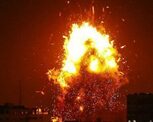
Israeli soldiers shot, on Friday at dawn, a young Palestinian man and a woman with rubber-coated steel bullets, and assaulted many others with clubs and batons, following dawn prayers at the Al-Aqsa Mosque, in occupied East Jerusalem.
Media sources said the soldiers assaulted dozens of worshipers, and fired rubber-coated steel bullets at them, before forcing them out of the courtyards of Al-Aqsa Mosque. video
They added that a young man, and a woman, were shot with rubber-coated steel bullets, before they were rushed to a local hospital.
Furthermore, the soldiers assaulted several Palestinians, distributing warm drinks to the worshipers near Bab Hotta, and abducted a young man, identified as Morad Misk. video
The Palestinian Islamic Waqf and Endowment Department in Jerusalem said undercover soldiers invaded the courtyards of Al-Aqsa right after dawn prayers were concluded, and violently assaulted the scholarship.
It denounced the ongoing and escalating Israeli violations against Al-Aqsa Mosque, and all holy sites in Palestine, especially in its occupied capital Jerusalem, and called on the international community to intervene.
Media sources said the soldiers assaulted dozens of worshipers, and fired rubber-coated steel bullets at them, before forcing them out of the courtyards of Al-Aqsa Mosque. video
They added that a young man, and a woman, were shot with rubber-coated steel bullets, before they were rushed to a local hospital.
Furthermore, the soldiers assaulted several Palestinians, distributing warm drinks to the worshipers near Bab Hotta, and abducted a young man, identified as Morad Misk. video
The Palestinian Islamic Waqf and Endowment Department in Jerusalem said undercover soldiers invaded the courtyards of Al-Aqsa right after dawn prayers were concluded, and violently assaulted the scholarship.
It denounced the ongoing and escalating Israeli violations against Al-Aqsa Mosque, and all holy sites in Palestine, especially in its occupied capital Jerusalem, and called on the international community to intervene.
23 jan 2020
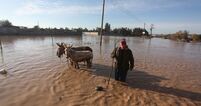
The municipality of Khan Yunis City in southern Gaza has accused the Israeli occupation authority (IOA) of intentionally releasing collected rainwater from dams in the east and swamping many areas of the city, especially the Salahuddin Street.
Mohamed al-Asttal, head of the municipality’s emergency committee, said on Wednesday that enormous amounts of water gushed out from dams in the east of Khan Yunis flooding agricultural areas near the border and penetrating the Salahuddin Street and other roads.
Asttal added the massive quantities exceeded the capacity of the drainage system in the street and swamped large parts of the road, prompting municipal emergency teams to move immediately to address the situation and prevent the closure of the street, which he described as a vital route for people coming from northern Gaza to the south and vice versa.
Recently, large swathes of cultivated land and farmlands were also flooded on different occasions when the IOA released collected rainwater into Gaza, causing hundreds of thousands of dollars’ worth of damage to agricultural areas in Gaza.
With no prior notice or regard for the local residents and their property, the IOA deliberately opens the floodgates of its dams and canals in the direction of the Gaza Strip in order to discharge water that accumulates due to heavy rains in the region.
Mohamed al-Asttal, head of the municipality’s emergency committee, said on Wednesday that enormous amounts of water gushed out from dams in the east of Khan Yunis flooding agricultural areas near the border and penetrating the Salahuddin Street and other roads.
Asttal added the massive quantities exceeded the capacity of the drainage system in the street and swamped large parts of the road, prompting municipal emergency teams to move immediately to address the situation and prevent the closure of the street, which he described as a vital route for people coming from northern Gaza to the south and vice versa.
Recently, large swathes of cultivated land and farmlands were also flooded on different occasions when the IOA released collected rainwater into Gaza, causing hundreds of thousands of dollars’ worth of damage to agricultural areas in Gaza.
With no prior notice or regard for the local residents and their property, the IOA deliberately opens the floodgates of its dams and canals in the direction of the Gaza Strip in order to discharge water that accumulates due to heavy rains in the region.
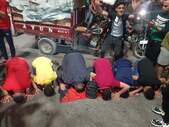
A previous infiltration attempt on Gaza border
An Israeli military helicopter on Wednesday night fired two missiles towards a border area near the security fence in northern Gaza, amid flares lighting the sky and intensive gunfire.
According to local sources, explosions rocked northern Gaza after aerial attacks by a helicopter somewhere in the area between the border fence in Gaza and Zikim settlement.
The Hebrew media talked about Gazan young men who infiltrated into an Israeli border area in the north of the Negev, without providing further details.
An Israeli military helicopter on Wednesday night fired two missiles towards a border area near the security fence in northern Gaza, amid flares lighting the sky and intensive gunfire.
According to local sources, explosions rocked northern Gaza after aerial attacks by a helicopter somewhere in the area between the border fence in Gaza and Zikim settlement.
The Hebrew media talked about Gazan young men who infiltrated into an Israeli border area in the north of the Negev, without providing further details.
22 jan 2020
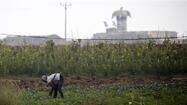
Israeli planes have reportedly sprayed toxic chemical substances and dangerous pesticides on farmlands near the Gaza Strip as the Tel Aviv regime presses ahead with its acts of aggression against the besieged Palestinian coastal enclave.
Israeli newspaper Haaretz reported on Wednesday that the Israeli army sprayed the area in close proximity to the fence separating the Gaza Strip from the Israeli-occupied territories for three days last week.
The report added that the Israeli ministry of military affairs has defended the aerial spraying after having refrained from it throughout last year, claiming that it was necessary to destroy “vegetation that obscures soldiers’ view of the area.”
According to the Palestinian Agriculture Ministry, Israeli pesticides damaged 14,000 dunams (3,459 acres) of agricultural land in Gaza from 2014 through 2018, destroying all the crops that had been sown there.
Palestinian farmers told Haaretz that 2019 was an excellent year for them as there was no spraying.
Three human rights organizations, namely Gisha, Adalah and al-Mezan, immediately urged Israeli authorities to cease spraying after the practice resumed last week, saying there were “serious fears” that it had already harmed farmers in the area.
Anwar Jamali, a Gazan farmer, said he and his fellow farmers were given no advance notice of the spraying.
“In previous years, there was major damage. Sometimes dozens of dunams of wheat, barley and parsley were completely lost,” he said.
Jamali added that the stench of the pesticides causes people to leave the area if they can, “but barley can’t get up and leave.”
According to Palestinian farmers, while spraying is done on the Israeli-occupied territories, “the wind then carries the pesticides into Gaza.”
A Forensic Architecture report from 2019 confirmed Palestinian claims that the pesticides spread into Gaza, reaching a distance of more than 300 meters from the Gaza-occupied territories fence.
Gaza has been under Israeli siege since June 2007.
Since 2008, Israel has waged three wars against Gaza, where about two million Palestinians live under a 12-year Israeli blockade. Thousands of Gazans have been killed in each of these deadly wars.
Israeli newspaper Haaretz reported on Wednesday that the Israeli army sprayed the area in close proximity to the fence separating the Gaza Strip from the Israeli-occupied territories for three days last week.
The report added that the Israeli ministry of military affairs has defended the aerial spraying after having refrained from it throughout last year, claiming that it was necessary to destroy “vegetation that obscures soldiers’ view of the area.”
According to the Palestinian Agriculture Ministry, Israeli pesticides damaged 14,000 dunams (3,459 acres) of agricultural land in Gaza from 2014 through 2018, destroying all the crops that had been sown there.
Palestinian farmers told Haaretz that 2019 was an excellent year for them as there was no spraying.
Three human rights organizations, namely Gisha, Adalah and al-Mezan, immediately urged Israeli authorities to cease spraying after the practice resumed last week, saying there were “serious fears” that it had already harmed farmers in the area.
Anwar Jamali, a Gazan farmer, said he and his fellow farmers were given no advance notice of the spraying.
“In previous years, there was major damage. Sometimes dozens of dunams of wheat, barley and parsley were completely lost,” he said.
Jamali added that the stench of the pesticides causes people to leave the area if they can, “but barley can’t get up and leave.”
According to Palestinian farmers, while spraying is done on the Israeli-occupied territories, “the wind then carries the pesticides into Gaza.”
A Forensic Architecture report from 2019 confirmed Palestinian claims that the pesticides spread into Gaza, reaching a distance of more than 300 meters from the Gaza-occupied territories fence.
Gaza has been under Israeli siege since June 2007.
Since 2008, Israel has waged three wars against Gaza, where about two million Palestinians live under a 12-year Israeli blockade. Thousands of Gazans have been killed in each of these deadly wars.
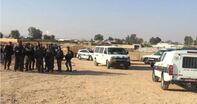
Israeli municipal officials escorted by police forces stormed on Tuesday Beer Haddaj village in the Negev desert, south of the 1984 occupied lands, and put up demolition orders against Palestinian homes and structures.
According to local sources, the municipal officials mapped and photographed the homes as a prelude to demolishing them later.
Several local villagers also suffered injuries when police forces violently suppressed them during the campaign.
The Beer Haddaj villagers have been exposed to unjustified assaults by Israeli police forces several times before.
According to local sources, the municipal officials mapped and photographed the homes as a prelude to demolishing them later.
Several local villagers also suffered injuries when police forces violently suppressed them during the campaign.
The Beer Haddaj villagers have been exposed to unjustified assaults by Israeli police forces several times before.
19 jan 2020
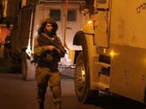
Israeli forces raided today a school and terrorized its students in the village Deir Nizam to the west of Ramallah in the occupied West Bank, according to local sources.
Soldiers raided the school and ransacked classrooms, causing horror and fear among students as they threatened to detain some of them. video
The soldiers claimed that rocks were thrown by some students at illegal settlers’ vehicles near the aforementioned village.
Soldiers raided the school and ransacked classrooms, causing horror and fear among students as they threatened to detain some of them. video
The soldiers claimed that rocks were thrown by some students at illegal settlers’ vehicles near the aforementioned village.

A Palestinian young man suffered a rubber bullet injury during clashes on Saturday evening between local youths and Israeli troops at the western entrance to Azzun town in the east of Qalqilya.
According to local sources, a military jeep went on fire after it was attacked with Molotov cocktails during the events.
In the nearby village of Kafr Qaddum, an Israeli military force was attacked with a teargas grenade during clashes with local youths.
In Jerusalem, Israeli police forces raided a commercial store belonging to a Palestinian citizen in Issawiya district and wreaked havoc on its contents.
Police forces also raided other stores in Ein Luza neighborhood in Silwan in search for West Bank workers. video
According to local sources, a military jeep went on fire after it was attacked with Molotov cocktails during the events.
In the nearby village of Kafr Qaddum, an Israeli military force was attacked with a teargas grenade during clashes with local youths.
In Jerusalem, Israeli police forces raided a commercial store belonging to a Palestinian citizen in Issawiya district and wreaked havoc on its contents.
Police forces also raided other stores in Ein Luza neighborhood in Silwan in search for West Bank workers. video
18 jan 2020
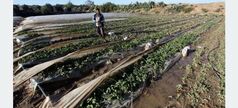
For the third time in one week, Israel opened today dams collecting rain water towards lands east of Gaza City, flooding hundreds of dunums of agricultural land, said witnesses.
WAFA correspondent reported, quoting witnesses, that Israel has intentionally opened the dams and drained the collected rainwater toward the Gaza Strip flooding and damaging hundreds of dunums of land planted with wheat, barley, peas, cabbage, and cauliflower. video
Losses to farmers were estimated in the thousands of dollars.
Last week, large tracts of agricultural land in the Gaza Strip were also flooded when Israeli authorities twice released the collected rainwater toward the coastal enclave.
Israeli drones were also seen spraying farmlands with poisonous pesticides, damaging large amounts of crops as a result.
WAFA correspondent reported, quoting witnesses, that Israel has intentionally opened the dams and drained the collected rainwater toward the Gaza Strip flooding and damaging hundreds of dunums of land planted with wheat, barley, peas, cabbage, and cauliflower. video
Losses to farmers were estimated in the thousands of dollars.
Last week, large tracts of agricultural land in the Gaza Strip were also flooded when Israeli authorities twice released the collected rainwater toward the coastal enclave.
Israeli drones were also seen spraying farmlands with poisonous pesticides, damaging large amounts of crops as a result.
